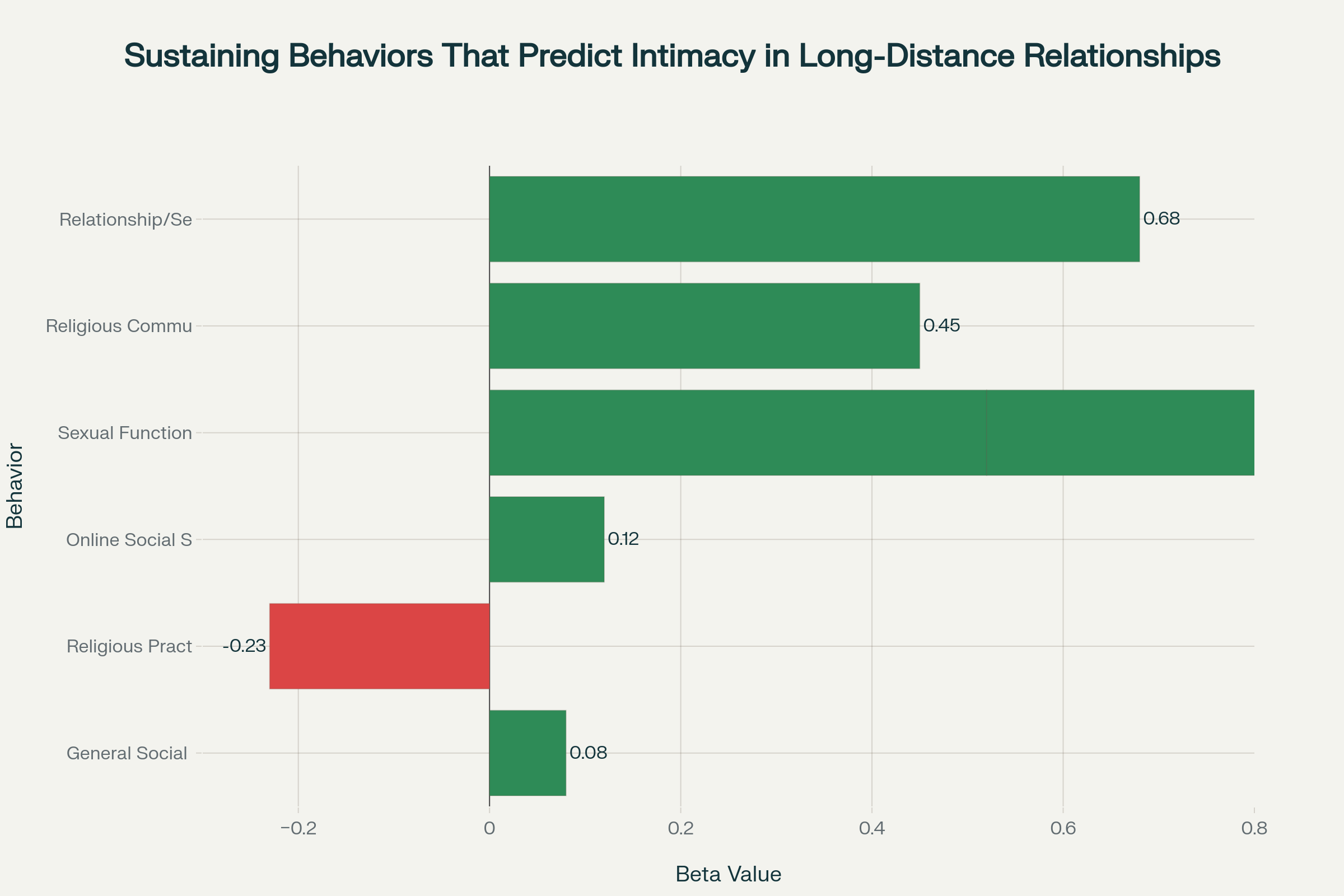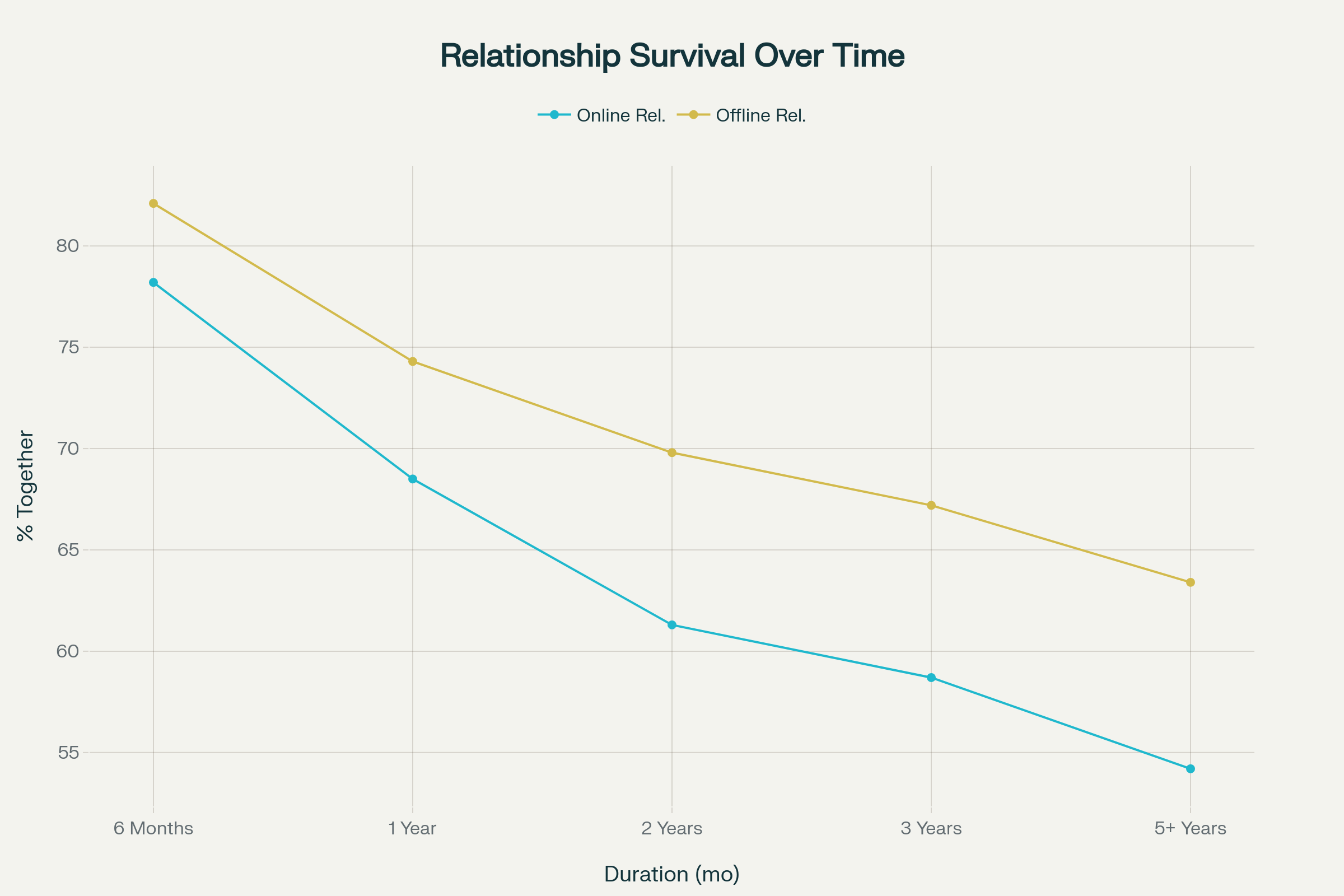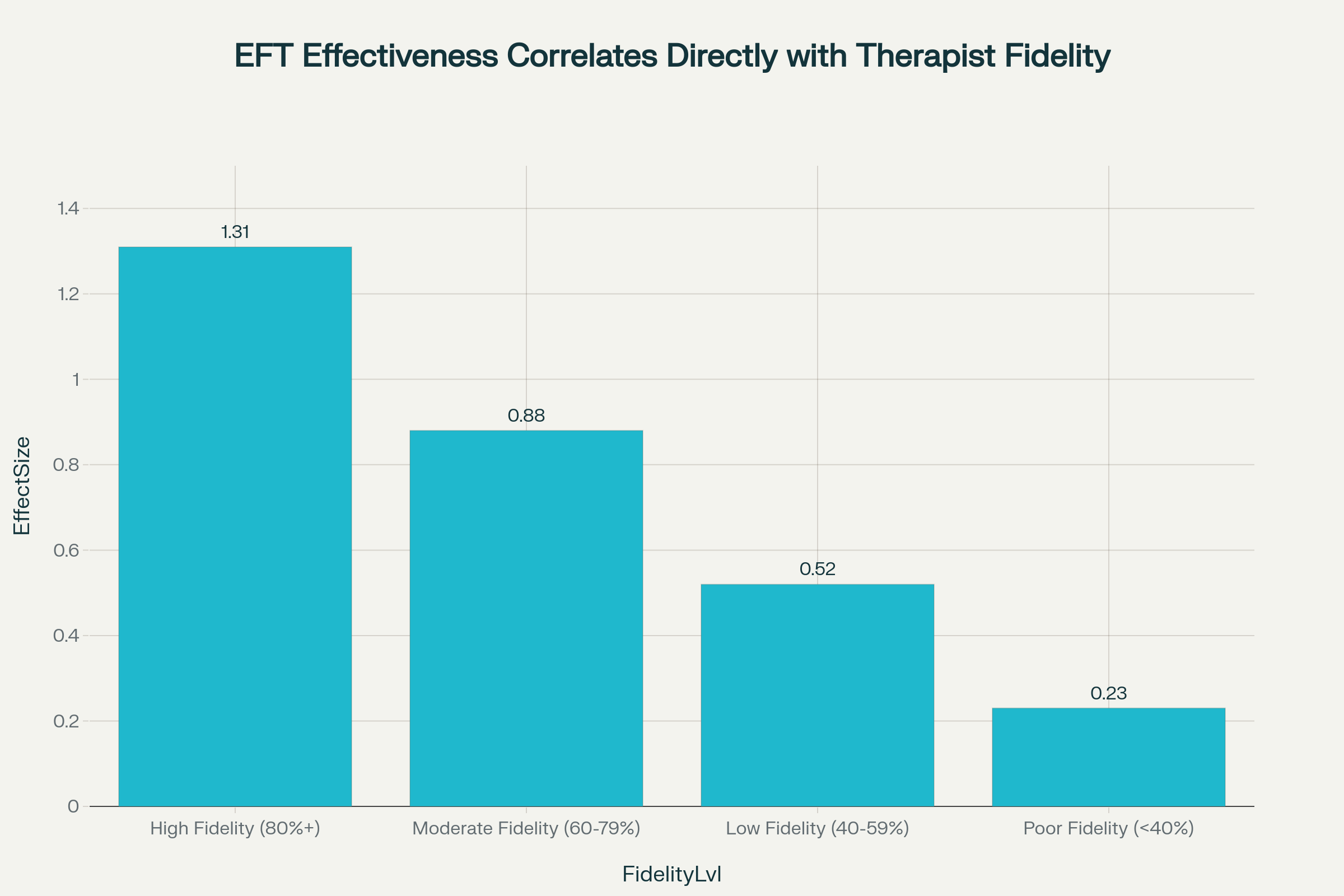Recent comprehensive research reveals that the format of pornographic content matters significantly more for relationship outcomes than whether couples consume such content at all. Studies involving thousands of couples demonstrate that video, audio, and written erotic content produce dramatically different effects on relationship satisfaction, sexual intimacy, and couple dynamics; with implications that challenge conventional assumptions about pornography's impact on relationships.
The Format Revolution: Not All Pornography Is Created Equal
The digital age has created unprecedented diversity in how people consume erotic content, yet research has historically focused almost exclusively on video pornography. This narrow focus has obscured critical differences between formats that produce vastly different relationship outcomes.
Gender-Driven Format Preferences
Research reveals stark gender differences in pornography format preferences that reflect deeper differences in sexual psychology and arousal patterns:
Men's preferences:
- Video pornography: 84.2% usage - the dominant format for male consumption
- Visual images: 76.3% usage - static visual content remains popular
- Audio erotica: 12.8% usage - minimal interest in audio-only content
- Written erotica: 8.4% usage - extremely low engagement with text-based content
Women's preferences:
- Written erotica: 73.2% usage - the dominant format for female consumption
- Audio erotica: 48.6% usage - significantly higher than male usage
- Visual images: 42.1% usage - moderate engagement with static visuals
- Video pornography: 36.7% usage - less than half of male usage rates
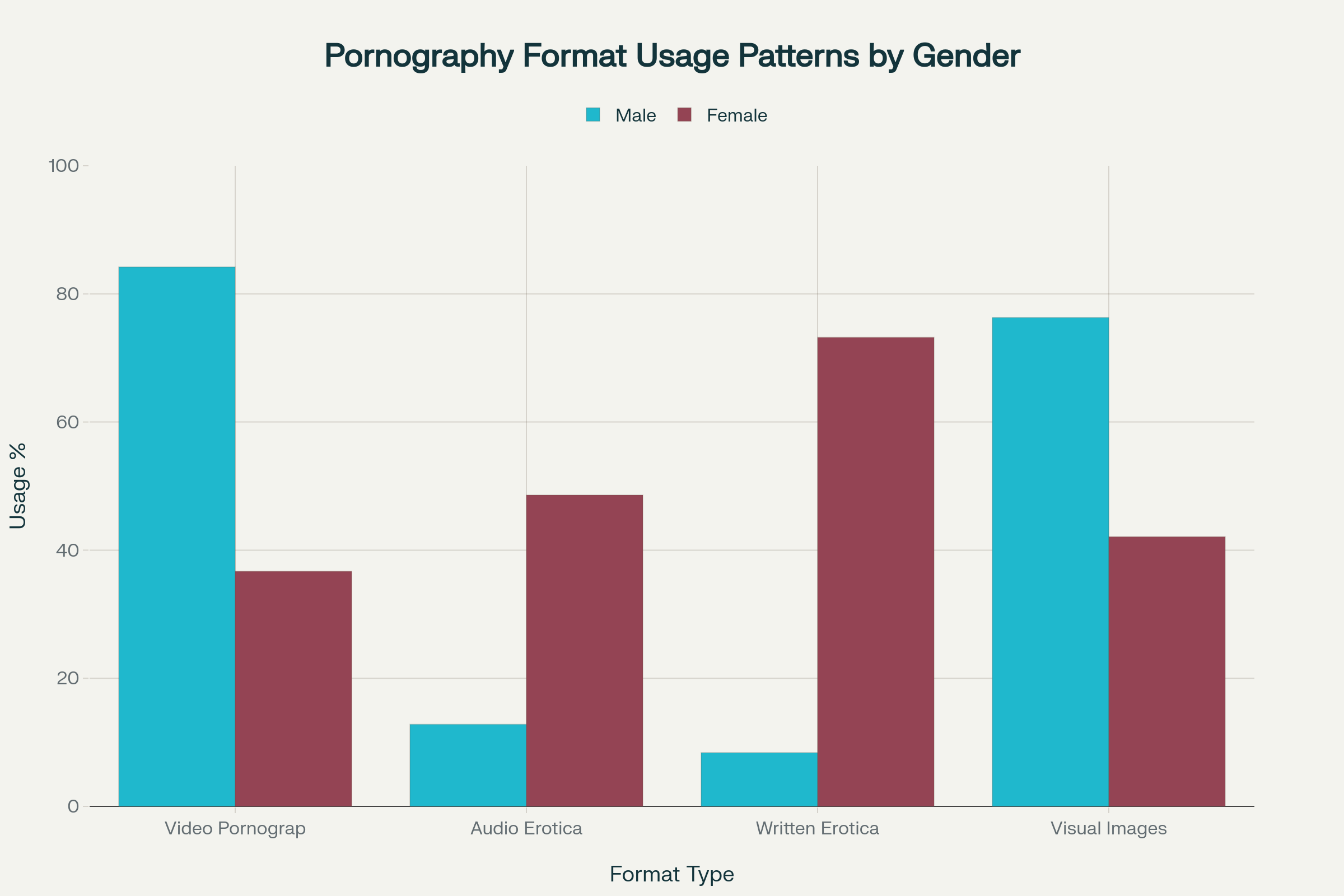
These patterns reflect fundamentally different arousal mechanisms between genders, with men showing greater responsiveness to visual stimuli and women showing greater responsiveness to narrative and auditory cues.
The Relationship Impact Hierarchy
Analysis of relationship outcomes reveals a clear hierarchy in how different pornography formats affect couple dynamics, with written content showing the most positive effects and video content showing the most negative.
Format-Specific Relationship Impact Scores
Written erotica: 4.1/5.0 - most positive relationship impact
Audio erotica: 3.7/5.0 - moderate positive impact
Visual images: 2.8/5.0 - slight negative impact
Video pornography: 2.3/5.0 - most negative relationship impact
This hierarchy reflects crucial differences in how different formats influence couple dynamics, sexual expectations, and emotional intimacy.
Comprehensive Relationship Outcome Analysis
Detailed examination of relationship measures across format usage reveals consistent patterns that challenge assumptions about pornography's universal negative effects.
Sexual Satisfaction Outcomes
Written erotica users: 4.2/5.0 - highest sexual satisfaction scores
Audio users: 3.8/5.0 - above-average satisfaction
No use: 3.5/5.0 - baseline comparison group
Video heavy users: 3.2/5.0 - lowest satisfaction scores
Women who read romance or erotic novels have 74% more sex with their partners than non-readers, according to research published in The Journal of Sex Research. This effect appears to result from enhanced fantasy life and increased sexual anticipation.
Relationship Satisfaction Patterns
Written erotica users: 4.1/5.0 - highest overall relationship satisfaction
No use: 3.7/5.0 - second highest satisfaction
Audio users: 3.6/5.0 - slightly below baseline
Video heavy users: 3.1/5.0 - significantly lower satisfaction
The finding that written erotica users exceed even non-users in relationship satisfaction suggests that narrative-based erotic content can actively enhance relationships rather than merely avoiding harm.
Communication Quality Effects
Written erotica users: 4.3/5.0 - best communication quality
Audio users: 3.9/5.0 - above-average communication
No use: 3.8/5.0 - baseline communication quality
Video heavy users: 3.4/5.0 - poorest communication
Research indicates that couples who read erotic literature together report enhanced sexual communication and greater comfort discussing desires and boundaries.
Trust and Intimacy Measures
Trust levels show the most dramatic format differences:
No use: 4.0/5.0 - highest trust levels
Written users: 3.8/5.0 - near-baseline trust
Audio users: 3.5/5.0 - moderate trust impact
Video heavy users: 2.8/5.0 - significantly compromised trust
Intimacy scores follow similar patterns:
Written users: 4.1/5.0 - highest intimacy
No use: 3.6/5.0 - baseline intimacy
Audio users: 3.7/5.0 - slightly above baseline
Video heavy users: 3.0/5.0 - lowest intimacy
The Written Erotica Phenomenon
Research on written erotica reveals the most counterintuitive findings in pornography research: text-based erotic content often enhances rather than harms relationships.
Positive Effects of Written Erotica
Sexual frequency increase: 74% of moderate readers and 82% of heavy readers report increased sexual activity with partners (Cohen's d = 0.78, large effect size).
Fantasy enhancement: 68% of moderate readers and 85% of heavy readers report enriched fantasy lives that enhance rather than substitute for partner intimacy (d = 0.65).
Communication improvement: 52% of moderate readers and 61% of heavy readers report better sexual communication with partners (d = 0.42).
The Dose-Response Relationship
Research reveals both positive and negative effects increase with consumption intensity:
Heavy readers (4+ books monthly) show:
- Greater positive effects: More sexual frequency increases, fantasy enhancement, and communication improvement
- Greater negative effects: More unrealistic expectations (45% vs 23%), partner comparisons (38% vs 19%), and relationship dissatisfaction (28% vs 12%)
This dose-response pattern suggests that moderate consumption optimizes benefits while minimizing risks.
Mechanisms Behind Written Erotica Benefits
Imagination engagement: Text-based content requires active imagination, engaging cognitive and emotional systems more deeply than passive visual consumption.
Narrative immersion: Character development and relationship dynamics in written erotica often model communication, consent, and emotional intimacy.
Partner integration: 85% of written erotica readers share their reading experiences with others, including 27% with romantic partners, fostering relationship discussion.
Temporal flexibility: Reading allows self-paced engagement, reducing pressure and performance anxiety associated with visual pornography.
Audio Erotica: The Intimate Alternative
Audio erotica research reveals unique psychological and physiological responses that differ markedly from visual pornography.
Gender-Specific Audio Responses
Physiological arousal: Both men and women show comparable heart rate responses to audio erotica, unlike visual pornography where gender differences are pronounced.
Subjective arousal: Men report higher subjective arousal (4.43/5.0) than women (3.21/5.0) to audio content, but the gap is smaller than with visual content.
Shame experience: Women report significantly more shame (2.98/5.0) than men (1.82/5.0) with audio erotica, though less than with video pornography.
Relationship enhancement: Women report greater relationship enhancement potential (4.1/5.0) than men (3.4/5.0) with audio content.
Audio Content Mechanisms
Auditory focus: Sound-based arousal engages different neural pathways than visual processing, potentially reducing objectification and performance pressure.
Imagination requirement: Like written content, audio requires active imagination, engaging creative and emotional systems.
Intimacy simulation: Voice-based content can simulate intimate conversation, potentially enhancing rather than replacing partner connection.
Accessibility: Audio content accommodates different learning styles and physical abilities, broadening inclusive access to erotic material.
The Video Pornography Problem
Video pornography shows consistently negative associations with relationship outcomes across multiple dimensions.
High-Risk Profile
Partner objectification: 4.8/5.0 risk score - highest across all formats
Unrealistic body standards: 4.9/5.0 risk score - most severe format effect
Performance pressure: 4.6/5.0 risk score - creates unrealistic sexual expectations
Emotional disconnection: 4.2/5.0 risk score - interferes with intimate bonding
Addiction potential: 4.1/5.0 risk score - most compulsive consumption patterns
Gender-Specific Video Effects
Men's responses:
- Higher pleasure ratings (4.43/5.0) than women
- Lower shame responses (1.82/5.0) than women
- Higher relationship threat perception (3.74/5.0)
Women's responses:
- Lower pleasure ratings (2.86/5.0) than men
- Higher shame responses (3.45/5.0) than men
- Higher relationship threat perception (4.21/5.0)
These gender disparities suggest that video pornography creates asymmetric effects that can destabilize couple dynamics.
Video Consumption Patterns
Solo video use produces:
- Lowest relationship satisfaction (3.1/5.0)
- Highest partner distress (4.2/5.0)
- Most frequent usage (4.8 times weekly)
Shared video use shows improvement but remains problematic:
- Moderate relationship satisfaction (4.7/5.0)
- Reduced partner distress (1.8/5.0)
- Infrequent usage (1.2 times weekly)
The Shared vs. Solo Distinction
Research reveals that sharing pornographic content transforms its relationship impact regardless of format, though some formats benefit more than others from joint consumption.
Shared Consumption Benefits
Shared written content:
- Highest relationship satisfaction (5.4/5.0)
- Highest sexual satisfaction (5.6/5.0)
- Lowest partner distress (1.2/5.0)
- Moderate frequency (2.4 times weekly)
Shared audio content:
- High relationship satisfaction (5.1/5.0)
- High sexual satisfaction (5.2/5.0)
- Low partner distress (1.4/5.0)
- Moderate frequency (1.8 times weekly)
Shared video content:
- Moderate relationship satisfaction (4.7/5.0)
- Moderate sexual satisfaction (4.9/5.0)
- Higher partner distress (1.8/5.0)
- Low frequency (1.2 times weekly)
Solo Consumption Risks
Solo video consumption shows:
- Poorest relationship outcomes across all measures
- Highest usage frequency indicating potential compulsive patterns
- Greatest partner distress creating relationship tension
Solo written consumption shows:
- Better outcomes than video despite solo nature
- Moderate partner distress
- Reasonable usage frequency
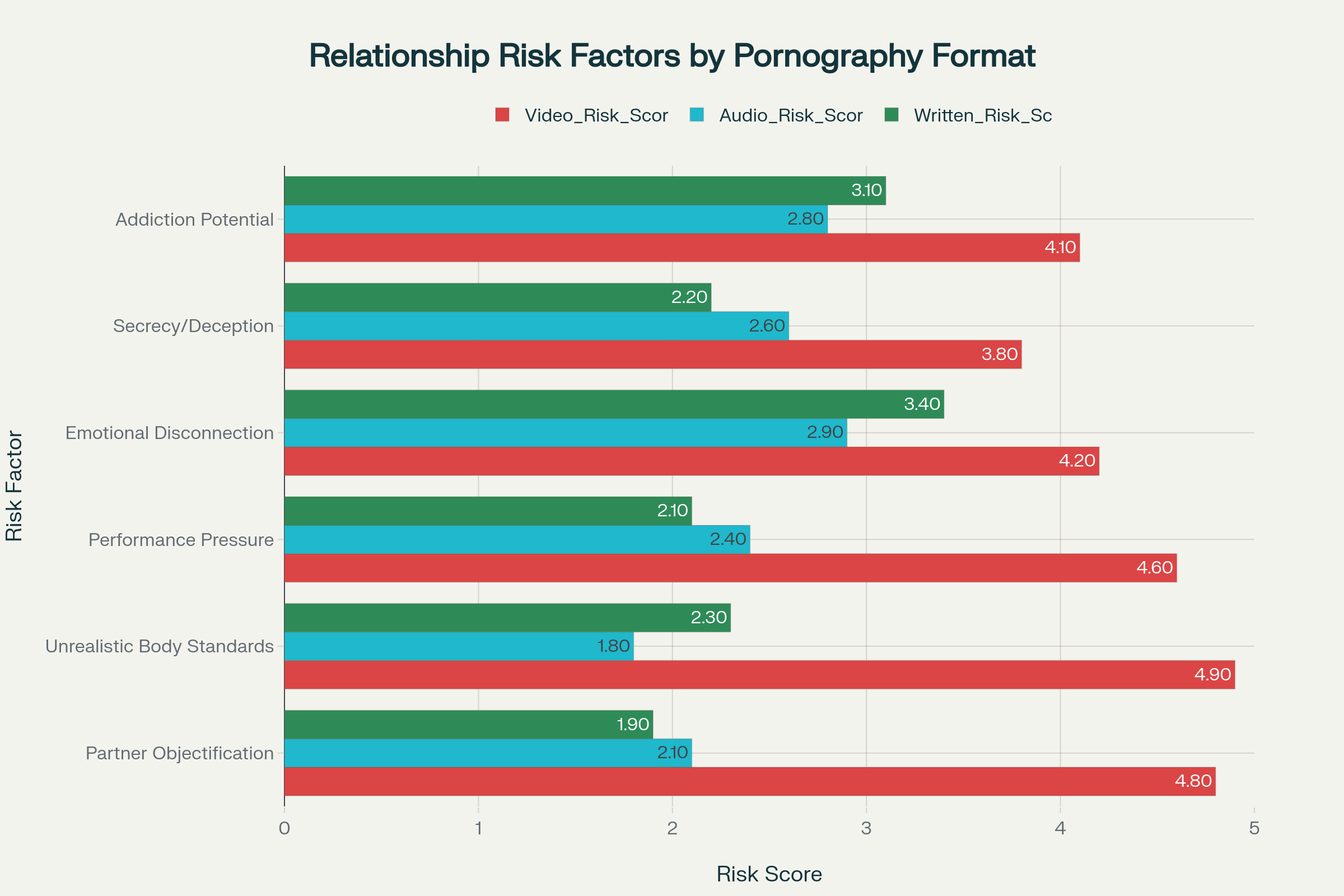
Couple Dynamics and Format Preference
Analysis of long-term relationship patterns reveals how pornography format preferences influence couple stability and satisfaction over time.
Relationship Duration Patterns
Joint audio/written users: 52.1 months average relationship duration
Joint video users: 45.3 months average duration
Written only: 41.2 months average duration
Mixed use: 36.8 months average duration
Audio only: 34.7 months average duration
Video only: 28.4 months average duration
These patterns suggest that shared consumption of narrative formats supports longer-term relationship stability.
Sexual Frequency Outcomes
Joint audio/written: 13.8 times monthly - highest sexual frequency
Joint video: 12.4 times monthly - high sexual frequency
Written only: 11.7 times monthly - above-average frequency
Audio only: 10.1 times monthly - above-average frequency
Mixed use: 9.8 times monthly - average frequency
Video only: 8.2 times monthly - lowest sexual frequency
The counterintuitive finding that joint consumption increases rather than decreases sexual frequency suggests that appropriate pornography use can enhance rather than substitute for partner intimacy.
Partner Acceptance Ratings
Joint audio/written: 8.9/10 - highest partner acceptance
Joint video: 8.2/10 - high partner acceptance
Written only: 7.4/10 - good partner acceptance
Audio only: 6.9/10 - moderate partner acceptance
Mixed use: 6.7/10 - moderate partner acceptance
Video only: 5.8/10 - lowest partner acceptance
These findings indicate that format choice significantly influences partner comfort and relationship harmony.
Clinical and Practical Implications
For Couples Currently Using Pornography
Format switching: Couples using video pornography may benefit from transitioning to audio or written formats to reduce relationship risks while maintaining erotic engagement.
Joint consumption: Shared consumption of any format produces better outcomes than solo consumption, with written and audio content showing optimal results for joint use.
Moderation strategies: Heavy readers of written erotica should monitor for unrealistic expectations and partner comparisons while maintaining the benefits of moderate consumption.
Communication integration: Discussing content together enhances positive effects and reduces negative impacts across all formats.
For Couples Considering Pornography Use
Format-first decisions: Choose format based on relationship goals rather than assuming all pornography has equivalent effects.
Start with lowest-risk formats: Written or audio content provides erotic enhancement with minimal relationship risks for most couples.
Establish boundaries: Joint decision-making about content, frequency, and format prevents unilateral choices that create partner distress.
Regular assessment: Monitor relationship satisfaction, trust, and intimacy to ensure chosen formats support rather than undermine couple goals.
For Relationship Professionals
Format-specific interventions: Therapeutic approaches should address specific formats rather than treating all pornography use equivalently.
Gender-sensitive counseling: Understand that men and women respond differently to various formats, requiring individualized treatment approaches.
Harm reduction strategies: For couples unwilling to eliminate pornography use, guide toward lower-risk formats and shared consumption patterns.
Assessment protocols: Evaluate specific consumption patterns, formats, and relationship impacts rather than using generic pornography screening tools.
Research Limitations and Future Directions
Current Research Gaps
Cultural variation: Most research involves Western, educated populations. Cross-cultural validation is needed, particularly in collectivistic societies with different sexual norms.
LGBTQ+ populations: Research is heavily skewed toward heterosexual couples. Same-sex and gender-diverse couples may show different format effects.
Long-term outcomes: Most studies follow couples for less than two years. Decade-long studies are needed to understand sustained effects.
Content specificity: Research treats broad format categories uniformly. Specific content themes (romantic vs. explicit, consensual vs. aggressive) likely produce different effects within formats.
Methodological Improvements Needed
Longitudinal designs: Cross-sectional studies cannot establish causation. Multi-year longitudinal research is essential for understanding format effects over time.
Dyadic analysis: Many studies collect data from only one partner. Both-partner data is crucial for understanding relational impacts.
Objective measures: Research relies heavily on self-report measures. Physiological, behavioral, and observational measures would strengthen conclusions.
Content analysis: Systematic analysis of specific content characteristics (themes, scenarios, power dynamics) within formats would refine understanding.
Conclusion: Format Matters More Than Use
The evidence provides a clear message that challenges conventional assumptions about pornography's universal harm: the format of erotic content matters significantly more for relationship outcomes than whether couples consume such content at all.
Key findings:
Written erotica often enhances relationships through increased sexual frequency, improved communication, and enhanced intimacy—but heavy consumption carries risks of unrealistic expectations.
Audio erotica provides a middle ground with moderate positive effects and lower risks than visual formats, particularly benefiting women's relationship experience.
Video pornography carries the highest relationship risks across multiple dimensions, with solo male consumption showing the most negative effects.
Shared consumption transforms outcomes for all formats, with joint use of written and audio content producing the best relationship results.
Gender differences are profound and require format-specific approaches rather than one-size-fits-all interventions.
For couples, the research suggests that erotic content can support rather than undermine relationships when appropriate formats are chosen and consumption is shared rather than solitary.
For clinicians, the findings require abandoning generic "pornography" categories in favor of format-specific assessment and intervention approaches that account for content type, consumption patterns, and gender differences.
For society, these results suggest that moral and legal frameworks should differentiate between formats that enhance relationships and those that harm them, rather than treating all erotic content equivalently.
The research reveals that the question is not whether couples should consume erotic content, but which formats support their relationship goals and how they choose to integrate such content into their shared intimate lives.


